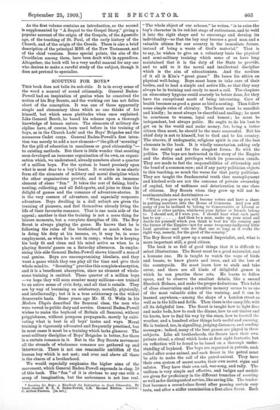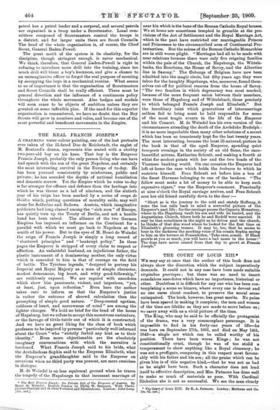SCOUTING FOR BOYS.*
THIS book does not belie its sub-title. It is in every sense of the word a manual of sound citizenship. General Baden- Powell had an inspiration of genius when he conceived the notion of his Boy Scouts, and the working out has not fallen short of the conception. It was one of those apparently simple and elementary ideas which no one thinks of for himself, but which seem platitudes when once explained. Like General Booth, he based his scheme upon a thorough knowledge of human nature. The elements of military dis- cipline have, of course, been used before in the training of boys, as in the Church Lads' and the Boys' Brigades and the numerous Cadet corps. General Baden-Powell's first inten- tion was merely to add a new element—" the gilt of scouting' for the pill of education in manliness or good citizenship "— to existing methods. But there is little wonder that scouting soon developed an immense organisation of its own, an organi- sation which, we understand, already numbers about a quarter of a million boys. For the system is based precisely upon what is most dear to a boy's heart. It contains in an elastic form all the elements of military and moral discipline which the other organisations provide, and it adds an immense element of sheer "fun." It takes the zest of fishing, bird's- nesting, collecting, and all field-sports, and joins to them the delight of games and the romance of adventure-stories. It is the very essence of adventure, and especially corporate adventure. Boys dwelling in a dull suburb are given the training of pioneers, and feel themselves already living the life of their favourite romance. That is one main side of the appeal; another is that the training is not a mere thing for leisure moments, but a complete discipline of life. The Boy Scout is always playing the game. He knows that he is following the rules of the brotherhood as much when be is doing his duty at his lessons, or, it may be, in some employment, as when he is out in camp ; when he is keeping his body fit and clean and his mind active as when he is playing Scouts' games on a Saturday afternoon. In empha- sising this side General Baden-Powell shows himself a man of real genius. Boys are uncompromising idealists, and they want a game which they can play all the time and give their whole mind to. " Scouting" provides this complete absorption, and it is a beneficent absorption, since no element of whole- some training is omitted. These quarter of a million boys —we hope they will soon number many millions—are trained to an active sense of civic duty, and all that it entails. They are by way of becoming an aristocracy, morally, physically, and intellectually; but it is a true aristocracy on the widest democratic basis. Some years ago Mr. H. G. Wells in his Modern. Utopia described the Samurai class, the men who were vowed to public duty and service. General Baden-Powell wishes to make the boyhood of Britain all Samurai, without priggishness, without pompous propaganda, merely by culti- vating what is best in all boys' tastes and ways. Moral training is vigorously advocated and frequently practised, but in most cases it must be a training which lacks glamour. The semi-military discipline of Boys' Brigades is better, for there is a certain romance in it. But in the Boy Scouts movement all the strands of wholesome romance are gathered up and interwoven. There is not one reasonable ambition of the human boy which is not met; and over and above all there is the charm of a brotherhood.
We would especially emphasise the higher aims of the movement, which General Baden-Powell expounds in chap. 10 of this book. The " fun " of it is obvious to any one with a scrap of imagination, but the seriousness is not less real.
• Scolding for Bove : a Handbook for Instruction in Good Citizenship. By Lieut.-General R. S. S. Baden-Powell, C.B. Revised Edition. London : C. Arthur Pearson. [U. net.] " The whole object of our scheme," he writes, " is to seize the boy's character in its red-hot stage of enthusiasm, and to weld it into the right shape and to encourage and develop its individuality—so that the boy may become a good man and a valuable citizen for our country in the immediate future, instead of being a waste of . God's material." That is
to say, he wishes to give on a voluntary basis the physical and semi-military training which some of us have long maintained that it is the duty of the State to provide, and to add to it the moral and intellectual discipline which is the aim of educationists. And the medium of it all is Kim's " great game." He bases his ethics on physical well-being. Boys must learn to take care of their bodies, and to lead a simple and active life, so that they may always be in training and ready to meet a call. The chapters on elementary hygiene could scarcely be better done, for they have the exceptional merit of being interesting. Care of health becomes as good a game as bird's-nesting. Then follow some simple rules of chivalry. The Scout must be unselfish and kindly; he must always be cheerful and smiling; he must be courteous to women, loyal and honest ; he must be independent, but always polite. He ought to do his best to get on in the world and make money, for, being a better
citizen than most, he should be the more successful. But his chief duty is not to himself, but to God and to his country..
The sincere, if undogmatic, religious spirit is one of the best elements in the book. It is wholly unsectarian, asking only for the reality and for the simplest forms. So with the politics. The boys are instructed in the story of the Empire- and the duties and privileges which its possession entails. They are made to feel the responsibilities of citizenship and the bond of a common race; and if any party politician objects to this teaching, so much the worse for that party politician.
They are taught the fundamental truth that unemployment and kindred evils are not the outcome of private ownership of capital, but of unfitness and deterioration in one class of citizens. Boy Scouts when they grow up will not be sentimentalists and doctrinaires :—
" When you grow up you will become voters and have a share in putting members into the House of Commons. And you will many of you be inclined to belong to Conservative or Liberal or Radical or other parties, whichever your father or friends belong to. I should not, if I were you. I should hear what each party has to say And then be a man, make up your mind and decide for yourself which you think is best for the country and the future of the Empire—not for some twopenny-halfpenny little local question—and vote for that one so long as it works the right way, namely, for the good of the country."
The Boy Scout will grow up a sound Imperialist, and, what is more important still, a good citizen.
The book is so full of good things that it is difficult to select illustrations. The Scout must be a good naturalist, And a humane one. He is taught to watch the ways of birds and beasts, to know plants and trees, and all the lore of the countryside. He must learn how to stalk and take cover, and there are all kinds of delightful games in which he can practise these arts. He learns to follow spoor, and to observe the smallest details, like a second Sherlock Holmes, and make the proper deductions. This habit of close observation and a retentive memory seems to us one of the most valuable sides of the training, and it can be learned anywhere,—among the shops of a London street as well as in the hills and fields. Then there is the camp life, with all its delightful lore. The Scout is taught how to light fires and make beds, how to cook the dinner, how to cut timber and tie knots, how to find his way by the stars, how to foretell the weather, and a hundred other things both useful and amusing.
He is trained, too, in signalling, judging distances, and sending messages ; indeed, many of the best games are played in these subjects. Like all brotherhoods, the Snouts have their own private ritual, a ritual which looks at first sight fantastic, but
on reflection will be found to be based on a thorough under- standing of boyhood. The boys are organised in patrols, each called after some animal, and each Scout in the patrol must be able to make the call of the patrol-animal. They have their own system of secret marks, their own'secret signs and
salutes. They have their own call, war-song, and rally. The uniform is very simple and effective, and badges and medals are given for proficiency in the different branches of scouting
as well as for distinguished service, like saving life. The tender- foot becomes a second-class Scout after passing certain easy tests, and after a stiffer examination a first-cIass Scont. Each
patrol has a patrol leader and a corporal, and several patrols are organised in a troop under a Scoutmaster. Local com- mittees composed of Scoutmasters control the troops in a district, and for larger units there are Scout Councils. The head of the whole organisation is, of course, the Chief Scout, General Baden-Powell.
The great merit of the system is its elasticity, for the discipline, though stringent enough, is never mechanical. We think, therefore, that General Baden-Powell is right in refusing to introduce more drill into the training, since too much drill will blunt a boy's keenness, and give a chance to an unimaginative officer to forget the real purpose of scouting by occupying the boys in a mechanical routine. What seems to us of importance is that the organisation of Scoutmasters and Scout Councils shall be really efficient. There must be general direction and the influence of a continuous policy throughout the whole movement. Also badges and medals will soon cease to be objects of ambition unless they are granted on some inflexible plan. If the need for this superior organisation is remembered, we have no doubt that the Boy Scouts will grow in numbers and value, and become one of the most powerful and beneficent movements in the Empire.











































 Previous page
Previous page